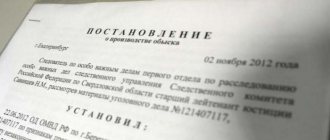Cases of detected theft fall within the scope of the Code of Administrative Offenses and criminal law. Criminal Code in Art. 158 stipulates that unlawful acts of gratuitous seizure of an enterprise’s property must be considered as theft. The result of such actions is causing material damage to the organization. If the amount of damage has not reached the level of 1000 rubles, then criminal liability is not provided for it - the punishment will be imposed according to the norms of the Code of Administrative Offenses (Article 7.27).
Question: No trade organization is insured against theft of goods. This issue is especially acute in retail trade, namely in the sales areas of self-service stores - various supermarkets. What documents should be used to confirm the fact of theft of goods, how to reflect the shortage in accounting and tax accounting (with the identification of the culprit and without identifying the culprit)? View answer
Article in the Criminal Code of the Russian Federation
Article 158 of the Criminal Code of the Russian Federation defines the concept of “theft” and indicates the penalties for the crime committed.
Theft is the secret theft of someone else's property.
The sanctions depend on how the theft was committed:
- Misappropriation or embezzlement of someone else's property by a person who was responsible for this property is punishable by:
- a fine in the amount of wages, other income or up to 120 thousand rubles;
- corrective labor for a period of six months;
- forced labor for up to two years
- restriction and or imprisonment for up to two years;
- The misappropriation or embezzlement of someone else's property committed by a group of persons by prior conspiracy and causing significant damage threatens the criminal with:
- a fine in the amount of up to 300 thousand rubles, or in the amount of wages for two years;
- compulsory work for up to 360 hours;
- correctional labor for up to one year;
- forced labor for up to five years with restriction of freedom for up to one year;
- imprisonment for a term of up to five years, with restriction of freedom for a term of up to one year.
- The same violation committed through the use of official position is punishable by:
- a fine in the amount of 150-500 thousand rubles or wages or other income for a period of 1 to 3 years;
- deprivation of the right to hold a certain list of positions and engage in a certain type of activity for a period of up to five years;
- forced labor for up to five years with restriction of freedom for 1.5 years or without limitation;
- imprisonment for a term of up to six years with a fine of up to 10 thousand or one month’s salary.
- The crime described in the paragraphs above, committed on a particularly large scale or by an organized group, has the following penalties:
- a fine of up to one million rubles;
- a fine in the amount of wages or other income for up to three years;
- imprisonment for up to 10 years.
How to reflect cash shortages in the cash book
There are no rules in the regulatory documents by which shortages must be reflected in the cash book. However, it is clear that it needs to be shown in column No. 5 “expenses”, and the basis will be the inventory act.
The order of reflection is as follows:
- Column 1 - date and number of the inventory report;
- column 2 - “Shortage”;
- column 3 - corresponding account 94;
- Column 5 - amount of shortage.
| Document No. | From whom it was received or to whom it was issued | Corresponding account number | Income, rub. cop. | Expense, rub. cop. |
| 1 | 2 | 3 | 4 | 5 |
| Balance at the beginning of the day | x | |||
| No. 21 from 07/02/2021 | Shortage | 94 | 4500 | |
So the balance at the end of the day will coincide with the actual one. If the cashier adds a shortage to the cash register, you will need to issue a PKO and make a record of the receipt.
What criminal penalties and liability are provided?
In accordance with accepted standards on the decriminalization of theft, criminal liability is provided if the theft was committed in an amount exceeding 5 thousand rubles. If the amount of stolen funds does not exceed the specified limit, the punishment will be administrative. However, if a citizen commits theft in an amount of less than five thousand not for the first time, there will be criminal liability for this. Criminal liability will also be applied if the theft was committed in an amount of less than five thousand rubles, but the crime was committed by a group of persons.
How to hold a cashier accountable
This cannot always be done. To hold a financially responsible person liable, the following conditions must be met:
- document the shortage;
- prove the employee’s guilt - due to intent or negligence;
- prove that the employee committed unlawful acts or omissions that directly led to the shortage.
Article 239 of the Labor Code of the Russian Federation lists cases when it is impossible to hold an employee financially liable. For example, there was a fire, the cashier was attacked by robbers and threatened with weapons, the employer did not equip the premises in accordance with all the rules for storing cash.
The financial liability of the cashier can be full or limited. If an agreement on full liability is concluded with him, then the entire amount can be recovered (Article 244 of the Labor Code of the Russian Federation). If there is no such agreement, the cashier’s liability is limited to his average monthly salary (Article 241 of the Labor Code of the Russian Federation).
What to do if you are accused of stealing money from a cash register
According to the presumption of innocence in force in the Russian Federation, a citizen is considered innocent until proven otherwise.
The employer has the right to dismiss an employee under clause 6 (d) part 1. Art. 81 of the Labor Code of the Russian Federation - for theft in the workplace - only when investigative actions are carried out, the employee’s guilt is proven and the court verdict comes into force.
If a citizen is accused of stealing money from a cash register, but he did not commit this, you need to act as follows:
- Find witnesses who saw the citizen at the alleged time of the crime and can confirm his alibi. Or witnesses who were near the employee of the establishment and can prove that he did not take funds from the cash register.
- File a civil claim for physical or moral compensation in court. As evidence, you should submit documents confirming the costs of purchasing medicines, a doctor’s conclusion that the suspect suffered moral damage and, as a result, his health condition worsened.
If law enforcement officers force you to write a confession, you should not do this; you should contact the prosecutor’s office to check the legality of their actions and a lawyer.
If the manager ordered the taking of money from the cash register and then accused the employee of theft, you need to tell the investigator about this fact. During the investigation, it can be proven that such an order was received from the manager; perhaps there were witnesses who heard about the management’s request. In this case, for a false denunciation, the employer faces liability under Article 306 of the Criminal Code of the Russian Federation “Knowingly false denunciation.”
How to protect a business from theft of money by an accountant?
Every company needs an annual independent accounting audit. Even if you are confident in your employee, he may withdraw money in small amounts, issuing “cash-outs” for consulting services, or write out funds to pay for accounting seminars that he never attended.
An accounting audit without a conclusion is inexpensive. Moreover, we can provide this service confidentially - your employee will not know about the verification. But the owner will be sure that accounting is carried out correctly, taxes have been paid and there are no thefts.
Write, call - we are always happy to help! Phone, WhatsApp
INTRODUCTION
The topic of this essay is: “Countering petty theft of the property of an employer organization by its employees.”
All businesses - production, trade, services - experience problems, to one degree or another, related to theft by their employees. Annual losses in companies due to theft, abuse or other fraudulent schemes of personnel can reach up to 7% of revenue. And these indicators are considered the norm for Russia. Research in the USA shows that currently, for this reason, employees bring losses to their companies in the amount of more than $1 billion a week. Internal theft and employee fraud can not only reduce the competitiveness of a company, but also lead it to collapse - bankruptcy. About 30 % of all bankruptcies are the result of abuse and theft by their own employees. Therefore, it can be unequivocally stated that the chosen essay topic is extremely relevant for study. The purpose of the work is to identify countermeasures used in the organization to combat petty theft by employees. To achieve this goal, it was necessary to solve the following tasks:
— determine the reasons that motivate employees of the organization to commit petty theft;
— study the countermeasures process aimed at preventing theft in the organization;
— consider the principles of combating petty theft in an organization;
— formulate recommendations to reduce theft of the organization’s property.
To write the work, educational and methodological literature, Internet sources, and articles from electronic periodicals were used.
1 COUNTERING PETTY THEFT OF PROPERTY OF THE ORGANIZATION – EMPLOYER BY ITS EMPLOYEES
To effectively combat petty theft of an organization’s property, it is necessary to initially determine the reasons that prompt employees to commit theft:
- desire to steal (motivational motive);
— the possibility of theft (impunity, lack of proper accounting).
Another important component is the criminal’s psychological justification for the theft. “It won’t decrease”, “everyone steals”, etc. – these pretexts allow a person to drown out his conscience.
There is also such a concept as “compensatory theft.” The staff, feeling that their work is not paid, i.e. is not properly assessed, making it possible to compensate for the difference through theft. Most of our people, when they appropriate the property of an enterprise, do not even consider it theft. They believe that they are just taking what their employer does not give them. This is a mentality that must be taken into account[1, p.160].
Preventing internal petty theft is a complex, comprehensive process, including work with personnel aimed at crime prevention. Large companies are developing programs to combat theft and fraud - this is a set of measures that includes a well-functioning system of internal control and audit, transparent procurement and tender procedures that do not allow inflating the cost of services or equipment, strict control over the expenditure of funds, as well as a control system , accounting, audits of economic and financial activities. These measures are aimed at combating the theft of corporate property. At the same time, the program is a set of motivational measures aimed at creating an intolerant attitude of employees towards theft and fraud [3, p.31-35].
The main task of the company is to make the staff realize that stealing is shameful, that by stealing from the company, an employee is stealing from himself and his colleagues. It is necessary to actively promote an honest lifestyle.
The introduction of a public control system and regular inspections of economic and financial activities have a positive effect. Based on the results of these activities, it is recommended to make decisions on punishing those responsible, including criminal prosecution.
The principle of inevitability of punishment, especially criminal punishment, must apply - this is an effective preventive measure for people involved in illegal activities.
The organization must adhere to the firm position that taking someone else’s property is a crime, and for this you can go to prison, inspection materials are transferred to law enforcement agencies, the company administration seeks to initiate criminal cases for theft and fraud, and full compensation for the cost of the stolen property. All leaders and managers caught stealing, without exception, are fired, the facts revealed become known to the public. Employees should feel this through concrete actions, and not through empty declarations of management.
It is necessary to create such working conditions in the company that each employee is concerned about the affairs of his company. Personnel motivation must clearly show that the salary of each employee depends on how well things are going.
Good theft prevention is the creation in the company of a model of employee behavior that is aimed at preventing illegal actions by employees on their own.
There is a method for preventing theft from EKB-SECURITY.RU, the essence of which can be briefly described by the expression “If you cannot defeat the enemy, create him and defeat him.”
Alternatively, you can specifically introduce your own person into the team, who, after working for a certain period of time, will commit a controlled theft. Of course, such an employee will be successfully detained. It is recommended that the detention and seizure of stolen property be carried out in a group with the involvement of police officers. To enhance the effect, after detection, it is recommended to inform colleagues that the employee has been fired under the article, and a criminal case has been opened. This can be confirmed by copies of documents posted on the staff information board[4, p.588].
After such an episode, management, together with the security service, has the opportunity to introduce regulations that limit the freedom of personnel. The team will accept such measures with understanding, without opposition.
The following principles of combating theft are identified:
1. An integrated approach - implementing measures on an ongoing basis to identify, prevent, suppress and investigate thefts, as well as carrying out work to minimize the negative consequences of thefts, including taking measures to compensate for the damage by those who committed thefts.
2. Economic feasibility - it is necessary to remember that implementation costs should not exceed the effect of application.
3. Coherence of actions - anti-theft activities should be carried out on the basis of clear, structured interaction between the company's divisions.
4. Effectively informing staff about anti-theft activities.
5. Involving all personnel, contractors, clients and partners in the process of combating theft.
6. Principled approach to violators - responsibility for committed acts should be the same for everyone, regardless of position, merit and personal relationships[2, p.300].
Generally accepted recommendations for reducing employee theft are:
1.Preliminary personnel screening of persons convicted of theft at previous places of work.
2. Use of a polygraph (lie detector) when hiring new employees or conducting internal investigations.
3. Work with the team - propaganda, encouragement of honest work in the company, creating an atmosphere of honesty and non-acceptance of theft in the team.
4. Systematic checks of the safety of inventory and cash. Creation of conditions for prompt detection of theft - accounting, inventory.
5. Personal responsibility of employees for entrusted property.
6. The principle of publicity of identified facts of theft. Condemnation by the collective. Board of shame.
7. The principle of the inevitability of the process of identifying theft itself.
8. Special control over the risk group of the team, new employees.
9. Giving strict punishment for theft. Dismissal under the article, transfer of material to law enforcement agencies.
10. Organization to combat theft and fraud (telephone, answering machine, e-mail, post office box, etc.).
11. Introduction of various types of special controls aimed at reducing the risk of theft.
12. Equipping facilities with engineering and technical security equipment and special instrumental control means [5].








